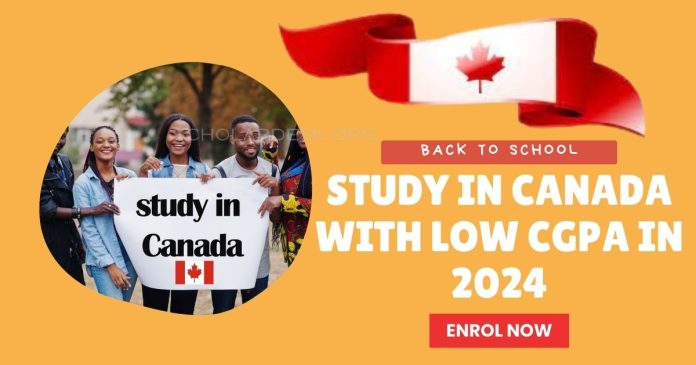Study in Canada With Low CGPA (2024)
Good day, and welcome back to Opportunities Corner. Previously, I shared information on how to be a student in Canadian universities without IELTS. However, as much as many students have the ability to join the universities, the undergraduate and postgraduate grades are essential for one to be considered a student. Canadian universities are leading ranked universities globally.
Is it possible to study in Canada just in case you have low grades, a low CGPA, or even less than 2.5 points? Yes it is. Not all universities in Canada demand high-grade points. Here, we will see Canadian universities with low CGPAs. And lastly, I will discuss the ways to get admission to Canadian universities with a GPA of less than 2.5.
Table of Contents
List of Universities to Study in Canada With Low CGPA
Here is a compilation of Canadian universities and colleges that accept students with low CGPA:
- University of Regina
- King’s University College
- Camosun College
- Vancouver Community College
- Conestoga College
- Algonquin College
- Capilano University
- Georgian College
- Humber College
- Centennial College
- University of the Fraser Valley
- Saint Thomas University
- Concordia University of Edmonton
- Vancouver Island University (Malaspina)
- Université Saint Paul
- OCAD University (Ontario College of Art & Design)
- Kwantlen University College
- Bow Valley College
- Fanshawe College
- Northern Alberta Institute of Technology
- Okanagan College
- George Brown College
- Douglas College
- Southern Alberta Institute of Technology
- Algoma University
- Langara College
- Mohawk College
233
Words
Mode:
EnhancedHumanize
These are the universities that accept a student to pursue a master’s for a student with a CGPA of less than 2.5 in Canada.
Good and Low CGPA
| CGPA Range | On a scale of 4.0 | On a scale of 5.0 |
|---|---|---|
| Excellent GPA | 4.0 | 4.5-5.0 |
| Good GPA | 3.3 – 3.7 | 3.5 – 4.4 |
| Low GPA | 2.7 – 3.0 | 2.5- 3.4 |
| Extremely Low GPA | 1.0 – 2.3 | 1.5-2.4 |
Securing Admission in Canada with a Low CGPA in 2023?
To secure master’s programs in Canada without experience, do the following:
- Persistence is Key: Keep applying to universities and don’t get discouraged by rejections.
- Get a Percentage Equivalence Certificate: This implies that you will have to visit the university and request for a certificate indicating the percentage of the top four semesters.
- Get academic recommendation letters: highlighting the professor or your preferred lecturer’s good recommendation to prove your academic potential.
- Prove Relevance experience and Skills: Encourage work experience, interests, and skills one may possess that are relevant to the master’s program you are applying for.
- Involve in Community service and Extracurricular: Highlight endeavors such as community organizing community service, leadership roles, and extracurricular activities.
- Develop a Strong Statement of Purpose: Write an interesting statement of purpose elaborating on your academic background, to view your career aspirations and why you are applying for that program.
- Prove Personal Skills and Interest: Present your certificates that support your achievements and any research project of your own.
- Ensure that recommendation letters are strong: This step and application will improve your chances of a master in Canada
Following these instructions and presenting a multi-faceted application will increase the chances of being admitted to Canadian universities with a CGPA that is too low.
Example of Percentage Equivalence Certificate
[University Letterhead]
[Date]
To Whom It May Concern,
This is to certify that [Student Name], a student of [Your University Name], has completed the [Bachelor’s/Masters] degree program in [Your Field of Study] at our university. Throughout the duration of studying the program, [he/she] has maintained a high level of commitment and hard work toward academic excellence.
I am pleased to inform you that given that the grading system of our university and the performance of [Student Name] in the last 4 semesters, the percentage equivalent of [his/her] CGPA s as follows:
- Excellent GPA (4.0 scale / 4.5-5.0 scale): [Percentage]%
- Good GPA (3.3 – 3.7 scale / 3.5 – 4.4 scale): [Percentage]%
- Low GPA (2.7 – 3.0 scale / 2.5- 3.4 scale): [Percentage]%
- Extremely Low GPA (1.0 – 2.3 scale / 1.5-2.4 scale): [Percentage]%
It is hoped that this equivalence certificate will give a better picture of [Student Name]’ s academic work and potential. I recommend [him/her] for academic and educational purposes.
Sincerely,
[University Official’s Name] [Position] [University Name]
How to Get into a Canadian University with a Low CGPA?
- Research Universities: Research universities that accept applicants with low scores, and identify those programs or departments that are not focusing energy on the GPA indicator.
- Highlight Relevant Experience and Skills: Focus on work experience, internships, and skills that prove field potential.
Conclusion
With a low CGPA example, the chance to be admitted to Canadian universities is still head based on other parts of an applicant’s personality and activity. Students must demonstrate potential, skills, achievements, and experience that go beyond merely academic GPA. So, present your candidacy integrated in a multi-faceted whole. And, good luck!

